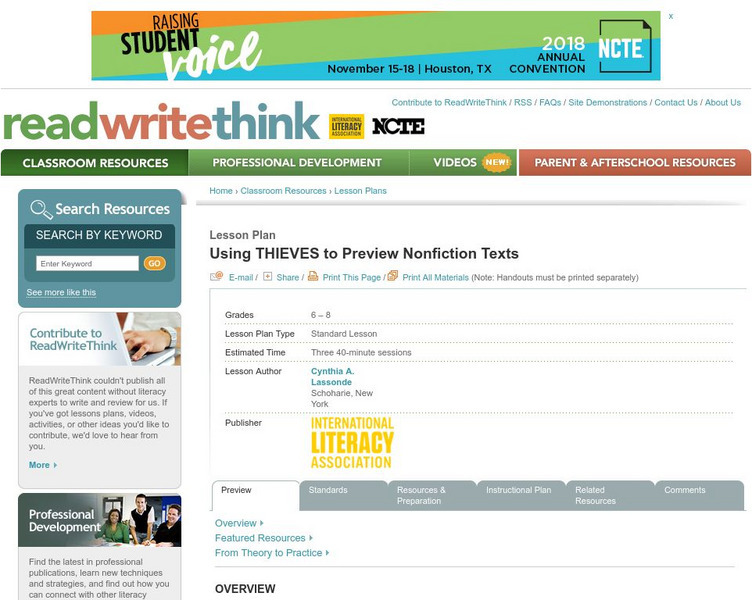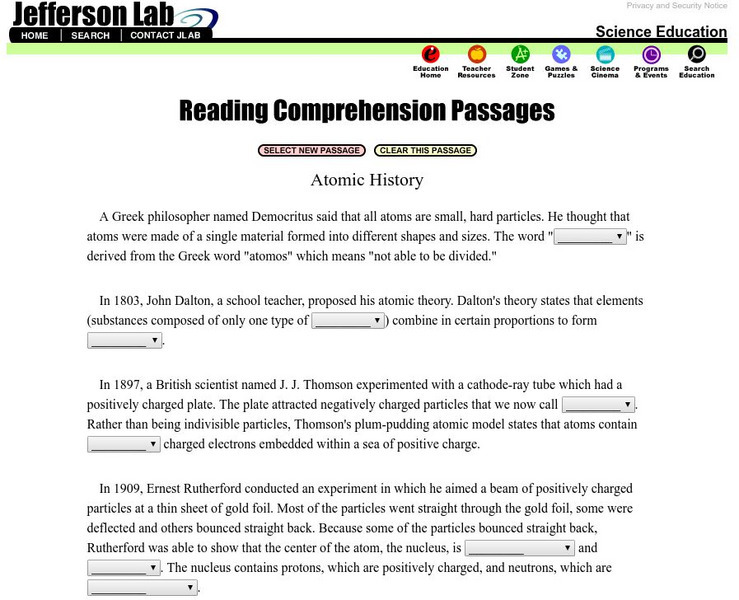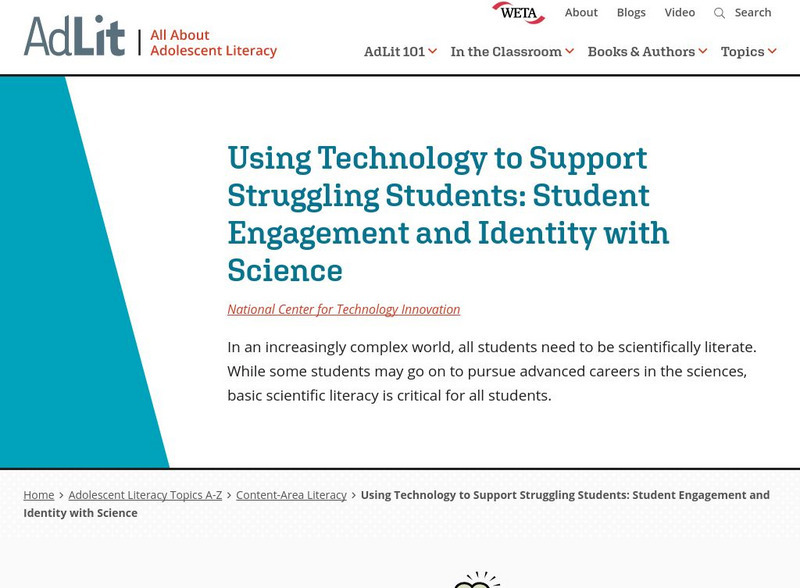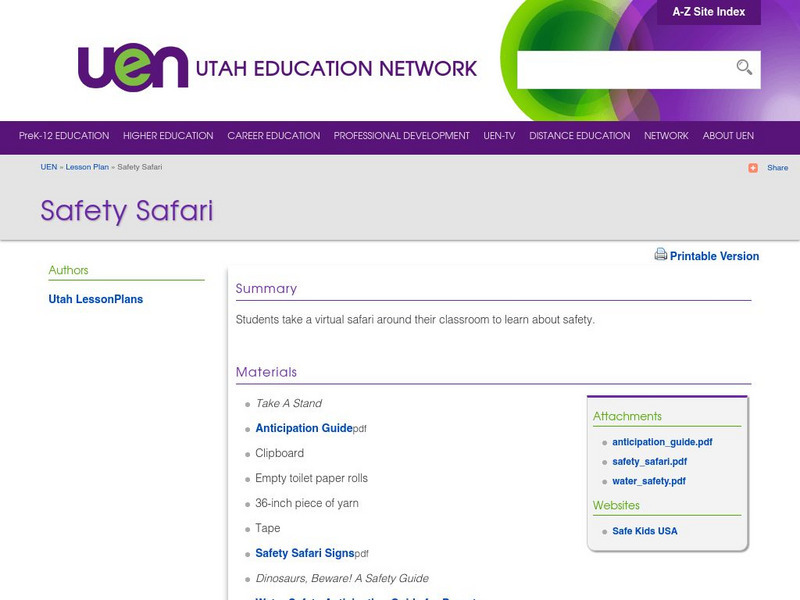Hi, what do you want to do?
EngageNY
TASC Transition Curriculum: Workshop 15
What do a cheetah, Audi commercial, and air have in common? They're all topics of an engaging inquiry-based, hands-on workshop for educators about background knowledge, reading strategies, the CER model, and argumentative writing. The...
New York State Education Department
TASC Transition Curriculum: Workshop 13
The six instructional shifts in this workshop definitely move math and science teachers' understanding of instruction. The workshop, 13th out of a series of 15, asks participants to examine sample tests and to look at how the six...
CPALMS
Cpalms: Graphic Organizers for Science Reading/writing
This resource provides multiple graphic organizers for reading and writing in the science content area. [Registration is required.]
Reading Rockets
Reading Rockets: Content Area Literacy
Content area lessons require specific techniques and knowledge that help students navigate different types of texts. Here you will find articles, videos, teaching strategies, webcasts, and research reports.
ReadWriteThink
Read Write Think: Using Thieves to Preview Nonfiction Texts
Contains plans for three lessons that introduce a nonfiction prereading strategy with the acronym THIEVES, which stands for Title, Headings, Introduction, Every first sentence, Visuals and vocabulary, End Questions, and Summary. In...
University of South Florida
Fcat Express: Fcat Practice Reading Tests
Provides nine interactive, online practice tests for the fourth grade Florida Comprehensive Assessment Test (FCAT). Each test uses a number of reading skills and uses both multiple choice questions and short written responses. It...
PBS
Pbs Learning Media: Walmart Middle School Litercy Initiative
Interactive, student-paced lessons on such literacy skills as categorizing, comparing and contrasting, summarizing, evaluating, determining cause and effect, using text features, connecting, inferring, sequencing, understanding problems...
AdLit
Ad lit.org: Content Area Literacy: Science
The demands of comprehending scientific text are discipline specific and are best learned by supporting students in learning how to read a wide range of scientific genres. Besides text structures emphasizing cause and effect, sequencing...
Thomas Jefferson National Accelerator Facility
Jefferson Lab: Reading Comprehension Passages
Read and fill in the blanks of science passages which range from easy to very hard. Each blank has a dropdown menu with choices. When you finish, click CHECK MY ANSWERS. If you pick a wrong answer, the right answer will be displayed...
Thomas Jefferson National Accelerator Facility
Jefferson Lab: Reading Passages: Atomic History
Read and fill in the blanks of this passage explaining atomic history. Each blank has a dropdown menu with choices. When you finish, click CHECK MY ANSWERS. If you pick a wrong answer, the right answer will be displayed along with your...
Other
Super Teacher Worksheets: Reading Comprehension: Hurricanes [Pdf]
Read the fifth-grade reading passages and charts about hurricanes by Erin Ryan and answer the comprehension questions over the selections. PDF includes an answer key with explanations.
Utah Education Network
Uen: The Good, the Bad, and the Both
After exposures to assorted forms of informational text and media, Istudents will identify positive and negative effects of microorganisms. Students will explore how some micooorganisms have overcome their negative attributes while...
University of California
Regents of the University of California: Using the Cognates Strategy
This strategy guide introduces an approach for making students aware of cognates (words that have a similar spelling, pronunciation, and meaning across languages) in content-area texts. This guide includes an introductory section about...
AdLit
Ad lit.org: Using Technology to Support Struggling Students
In an increasingly complex world, all students need to be scientifically literate. While some students may go on to pursue advanced careers in the sciences, basic scientific literacy is critical for all students.
Polk Brothers Foundation Center for Urban Education at DePaul University
De Paul University: Center for Urban Education: I Can Classify and Infer When I Read [Pdf]
This site contains links to two graphic organizers to guide and assess the understanding of nonfiction text in science and social studies.
Reading Rockets
Reading Rockets: Reading Topics a to Z: Scientific Language in Primary Grades
Research on the importance of teaching scientific language usage, ideas for utilizing scientific language, and rubrics for assessing student use of scientific language in grade schools.
Polk Brothers Foundation Center for Urban Education at DePaul University
Depaul University: Center for Urban Education: Classify Facts and Opinions [Pdf]
Students will find three lessons about facts and opinions in this learning module. The following topics are linked in the module: contrast and evaluate fact and opinion; classify facts and opinions; and locate and classify facts.
Polk Brothers Foundation Center for Urban Education at DePaul University
De Paul University: Center for Urban Education: I Can Locate and Classify Information [Pdf]
A blank T-Chart is provided for students to use as they sort facts into two categories. Students will classify science information with this aid.
Writing Fix
Writing Fix: Power Point Life Span Diaries
Students research an animal or other living creature and create a life-span diary similar to the one they read about in the book Diary of a Worm by Doreen Cronin. PowerPoint presentations are made for students to use while sharing their...
Writing Fix
Writing Fix: Writing Scientific "Recipes"
Adapted from a lesson in the book 51 Wacky We-Search Reports by Barry Lane, this lesson asks students to read several recipes to gain an understanding of how they are written and the types of words they use. Then students demonstrate...
Polk Brothers Foundation Center for Urban Education at DePaul University
De Paul University: Center for Urban Education: Classify and Summarize Information [Pdf]
This learning module contains a link to graphic organizers that will help students categorize content and comprehend short and extended texts. The graphic organizers are designed to be applied to reading nonfiction passages in science...
Utah Education Network
Uen: Safety Safari
Second graders will engage in nonfiction reading and writing strategies that will help them describe and adopt safe and healthy behaviors. An anticipation guide, a song, and several high-interest trade books will engage the the readers...
Broward Education Foundation
Broward Education Foundation: News Is Knowledge! [Pdf]
The project provides teachers with ideas to create literacy centers for use in their own classrooms using student-friendly newspapers from various curricular areas. We will provide plans that can be used to adapt the materials each week....
Alabama Learning Exchange
Alex: Time Flies
This lesson plan is one of the first in a unit on telling time which addresses the following content areas: language arts, math, science, social studies, and technology. Students will read several resource books to gather information....















![De Paul University: Center for Urban Education: I Can Classify and Infer When I Read [Pdf] Unit Plan De Paul University: Center for Urban Education: I Can Classify and Infer When I Read [Pdf] Unit Plan](https://content.lessonplanet.com/knovation/original/119984-1e8c3bd778b0e773bd6dcdc545a348e7.jpg?1661787061)

![Depaul University: Center for Urban Education: Classify Facts and Opinions [Pdf] Unit Plan Depaul University: Center for Urban Education: Classify Facts and Opinions [Pdf] Unit Plan](https://content.lessonplanet.com/knovation/original/119988-719af6c927af61affa025c27754c7fae.jpg?1661787067)


![De Paul University: Center for Urban Education: Classify and Summarize Information [Pdf] Unit Plan De Paul University: Center for Urban Education: Classify and Summarize Information [Pdf] Unit Plan](https://content.lessonplanet.com/knovation/original/78057-7ba90e0b8b82fde8e26d306a4af31f79.jpg?1661787062)

